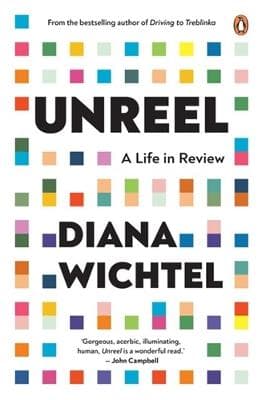Review: Unreel, by Diana Wichtel
Reviewed by David Hill
Let's start with some history. For a few years, back in the 1990s, Diana Wichtel and I shared a page of the Listener. Alternated on it, at any rate, as we were both writing TV reviews. Week about, our 600 words would appear, in my case with a photo that must have had parents seizing their children protectively.
Wichtel was good. Oh, she was good. She was succinct, demotic yet elegant, had already developed that tone of mildly bemused fascination with human foibles that characterises much of her writing. She liked the medium, respected it, believed it should be held to high critical standards. She sometimes made TV producers and members of the public splutter apoplectically on the magazine's Letters pages; what better sign could there be that she was doing her job well?
And she was kind. Personally kind. When a tetchy print editor pilloried me after I made what I thought were a couple of mild jokes about his publication, she wrote me a note so supportive, so collegially affirming, that I came out from behind the sofa where I'd been hiding.
Over the decades, Wichtel has achieved something both impressive and paradoxical. She still writes mainly about media (no, I haven't forgotten her affecting, award-winning Driving to Treblinka), and in the process, she's produced durable, significant work about something that...well, often isn't.
She'll disagree with me about that last bit. Her columns, reviews, essays often affirm that the best of TV – and other media – can encapsulate powerful, permanent human emotions; anatomise society; capture the zeitgeist of the age. As she writes here, it can be 'magic, imbued with a dreamy, inexplicable aura'.
She got hooked on it early, growing up in Canada, watching a set that brought 'a world lived in badly lit monochrome'. Being an immigrant in NZ may have made her more receptive to subtext and context. She tried primary teaching, 'got hitched at 21', and in 1989 joined the Listener, in an office full of Twink and cumbrous manual typewriters. Suddenly, she was a television critic, a job where you 'spend your professional life immobile amid a pile of snack wrappings'.
I'll get to her reviews in a minute. Because Unreel is also a jewel casket of incident and anecdote. Her Mum's front tooth goes shootabout. Wichtel destroys a glass tabletop while watching the box. She goes to London to collect stories for the year ahead and the city's water ruins her hair. While she's there, she interviews William Roache (Ken Barlow! You must know that!) and 29 others. When she gets back to NZ, her expenses are queried – because they aren't high enough. She can fit all this into 4-5 pages. You will be entertained. All the time.
She's kept the abusive letters she's received; uses a number as chapter sub-headings. 'In response to Diana Wichtel's jaundiced diatribe....' At least that one spelt her name correctly. Just a few times, the complaints may have been justified; after all, she did confuse DIY with DIC.
The programmes. Memory Lane gets paced a fair bit. Remember Shark in the Park, Gloss, Holmes, Melody Rules, The Crunchie Train Robbery commercial, the Jockey Juniors ad? She brings them back.
She's good at showing programmes as paradigms of their times. Across the chapters, she builds what's almost a condensed history of western TV, from Ed Sullivan and The Howdy Doody Show (do not ask) to Breaking Bad. She picks the greats: Monty Python, 'simultaneously erudite and preposterous'.
She offers perspective: falls and rises, ebbs and more ebbs. And of course, part of the appeal is that she's often writing about people we know, or think we do. Freight trains of characters' names sway past.
Along with the critical, there's the biographical. The father left in Canada, the reconstructed family in NZ, the pressured mother, discoveries and deaths ('I miss you, too, Mum'). Above all is the protracted, painful quest for her damaged Dad, till 'there's no more shutting the door', and resolution of sorts is reached. Driving to Treblinka handled similar stuff splendidly. So does this book.
It sparkles with slyly inventive writing. Wichtel's chopped, tossaway sentences can be packed with pathos – or derision. Just occasionally she gets a bit arch; hardly surprising when every column she's ever written has to be wise and witty in a few hundred words.
'Moving pictures unreeling. A love story,' she wrote of English comedian Bob Monkhouse. A lot of it's been that way for her. She mentions me: on p 178, since you were about to ask. I'm chuffed, Diana. I'm also as impressed as hell by your book. Do keep on Wichteling.
Reviewed by David Hill
